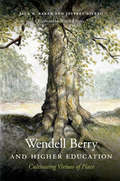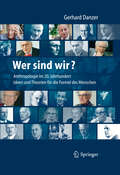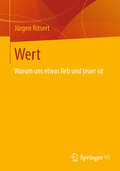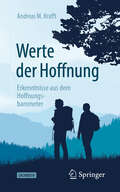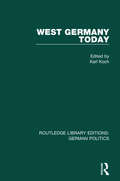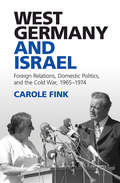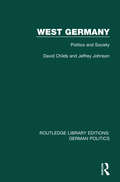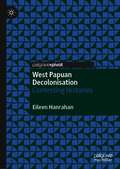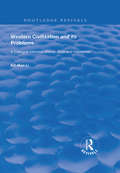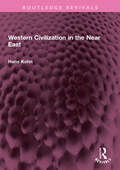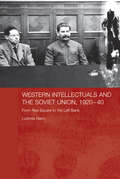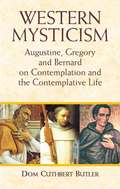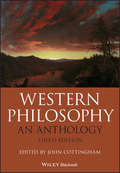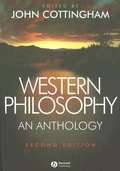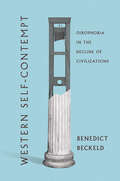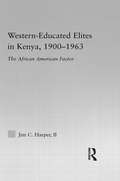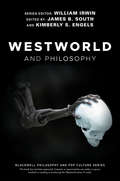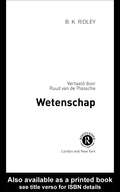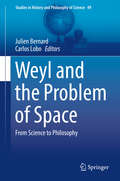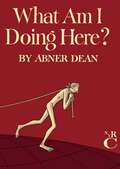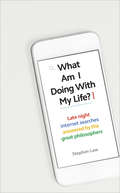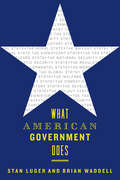- Table View
- List View
Wendell Berry and Higher Education: Cultivating Virtues of Place (Culture of the Land)
by Jeffrey Bilbro Jack R. BakerWhy the university should focus on community: “An enlightening interpretation of Wendell Berry’s philosophy for the pursuit of a holistic higher education.” —Publishers WeeklyProminent author and cultural critic Wendell Berry is well known for his contributions to agrarianism and environmentalism, but his commentary on education has received comparatively little attention. Yet Berry has been eloquently unmasking America’s cultural obsession with restless mobility for decades, arguing that it causes damage to both the land and the character of our communities. The education system, he maintains, plays a central role in this obsession, inculcating in students’ minds the American dream of moving up and moving on.Drawing on Berry’s essays, fiction, and poetry, Jack R. Baker and Jeffrey Bilbro illuminate the influential thinker’s vision for higher education in this path-breaking study. Each chapter begins with an examination of one of Berry’s fictional narratives and then goes on to consider how the passage inspires new ways of thinking about the university’s mission. Throughout, Baker and Bilbro argue that instead of training students to live in their careers, universities should educate students to inhabit and serve their places. The authors also offer practical suggestions for how students, teachers, and administrators might begin implementing these ideas.Baker and Bilbro conclude that institutions guided by Berry’s vision might cultivate citizens who can begin the work of healing their communities—graduates who have been educated for responsible membership in a family, a community, or a polity.
Wer sind wir? Auf der Suche nach der Formel des Menschen
by Gerhard DanzerAnthropologie ist der Versuch des Menschen, nach seinem Wesen und seiner Natur zu fragen sowie seine Herkunft und Möglichkeiten zu ergründen. Während sich Philosophen schon immer mit diesem Thema beschäftigt haben, sind im 20. Jahrhundert viele Disziplinen hinzugekommen. Der Autor beschreibt anhand von 35 biografischen und werkanalytischen Erörterungen, wie sich Ärzte und Philosophen im 20. Jahrhundert auf die Suche nach der "Formel des Menschen" begeben haben. Dabei setzt er sich mit den verschiedenen Denkrichtungen kritisch auseinander.
Wert: Warum uns etwas lieb und teuer ist
by Jürgen Ritsert"Wert" ist ein Grundbegriff, der im Alltag sowie in einer ganzen Reihe von Fachwissenschaften meist mit aller Selbstverständlichkeit benutzt wird: in der Moralphilosophie, der Ökonomie, der Politologie, der Soziologie, der Ethnologie und der Kulturanthropologie. Doch er ist und bleibt - wie schon Max Weber festgestellt hat - ein "Schmerzenskind" der Kulturwissenschaften. Dieser Essay informiert über einige Kontroversen über den Wertbegriff sowie einige begehbare Pfade in der Sumpflandschaft des Wertdiskurses. Der Text steht in einem inneren Zusammenhang mit den beiden Essays des Verfassers über den Problembegriff und vier Grundbegriffe der politischen Philosophie (2012).
Werte der Hoffnung: Erkenntnisse aus dem Hoffnungsbarometer
by Andreas M. KrafftTäglich werden wir über die Medien mit negativen Nachrichten aus aller Welt konfrontiert. Kein Wunder, dass sich viele Menschen Sorgen machen, Ängste entwickeln und pessimistisch in die Zukunft schauen. Dieses Sachbuch berichtet in anschaulicher und überzeugender Weise über die Entstehung und Bedeutung von Weltanschauungen und universellen Werten als eine wichtige Quelle von Hoffnung. Seine Wirkungskraft gewinnt dieses Werk aus der Integration von Theorie und Praxis. Der Leser erfährt über die empirischen Ergebnisse aus dem Hoffnungsbarometer, einer jährlichen, wissenschaftlich breit angelegten Umfrage über die Hoffnungen der Menschen, die in einem philosophischen und psychologischen Gesamtzusammenhang prägnant dargestellt werden. Dadurch findet der Leser Antworten auf zentrale Fragen, die zu einer zukunftsorientierten und durch Zuversicht gekennzeichneten Lebensgestaltung verhelfen können: Welche Hoffnungen, Einstellungen und Werte sind für ein erfülltes und harmonisches Leben förderlich und welche halten den Menschen in einem selbst gebauten Gefängnis fest?Was kann der Einzelne tun, um in einer bedrohlich erscheinenden Welt zu einem Leuchtturm der Hoffnung für sich und andere zu werden? Wie kann die Menschheit aus der Sackgasse von Egoismus, Angst und Konfrontation herausfinden und auf einen Weg des gegenseitigen Verständnisses, der Zuversicht und des Friedens gelangen? Zielgruppen: Alle an Hoffnung interessierten Menschen und alle, die ermutigt in die Zukunft blicken möchten. Zum Autor: Dr. Andreas M. Krafft ist Associate Researcher am Institut für Systemisches Management und Public Governance an der Universität St. Gallen. Als Co-Präsident von swissfuture, der Schweizerischen Vereinigung für Zukunftsforschung, leitet er das internationale Netzwerk des Hoffnungsbarometers. Er ist Vorstandsmitglied des International Hope Institute in den USA.
Weshalb auf die Wissenschaft hören?: Antworten aus Philosophie und wissenschaftlicher Praxis
by Dennis Lehmkuhl Andreas BartelsPandemie und Klimakrise rufen die herausragende Rolle der Wissenschaft und des wissenschaftlichen Wissens für Informierung und Orientierung der Gesellschaft sowie für die Beratung der Politik bei der Ausrichtung praktischer Maßnahmen ins Bewusstsein. In diesem Zusammenhang wird die Frage virulent, weshalb der Wissenschaft diese herausgehobene Rolle zukommt. Dass diese Frage trotz der vielbeschworenen Autorität der Wissenschaft alles andere als trivial ist, zeigt sich daran, dass Wissenschaftsskepsis und Relativierung wissenschaftlicher Resultate bis hin zur Wissenschaftsleugnung Einfluss gewinnen, sobald es um konkrete Fragen der Ausrichtung gesellschaftlichen Handelns an der Wissenschaft geht. Wodurch ist also Vertrauen in die durch die Wissenschaft ermittelten Fakten, die in ihren Modellen entworfenen Szenarien und ihre Ratschläge an Gesellschaft und Politik gerechtfertigt? Weshalb soll man der Wissenschaft in besonderem Maße vertrauen und auf ihren Ratschlag hören?Insgesamt sollen die Beiträge des Buches Aufschluss darüber geben, wodurch die Vertrauenswürdigkeit der Wissenschaft in ihrer modernen Form gerechtfertigt ist und an welche Bedingungen ihre besondere Rolle in der Gesellschaft geknüpft ist. Was kann Wissenschaft für die Gesellschaft leisten und wo liegen die Grenzen ihrer orientierenden Rolle? Was heißt es „auf die Wissenschaft zu hören“ und was sind die Bedingungen dafür, dass Menschen in einer demokratischen Gesellschaft sich wissenschaftliche Erkenntnisse aneignen und sie als Richtschnur für ihr Handeln verwenden?
West Germany Today (Routledge Library Editions: German Politics)
by Karl KochThis authoritative study, written by experts in their fields and originally published in 1989, provides a comprehensive introduction to aspects of West German society, politics and economics. Individual chapters investigate West German politics, education, industrial relations, the media and the relations between the two German states.
West Germany and Israel: Foreign Relations, Domestic Politics, and the Cold War, 1965–1974
by Carole FinkBy the late 1960s, West Germany and Israel were moving in almost opposite diplomatic directions in a political environment dominated by the Cold War. The Federal Republic launched ambitious policies to reconcile with its Iron Curtain neighbors, expand its influence in the Arab world, and promote West European interests vis-à-vis the United States. By contrast, Israel, unable to obtain peace with the Arabs after its 1967 military victory and threatened by Palestinian terrorism, became increasingly dependent upon the United States, estranged from the USSR and Western Europe, and isolated from the Third World. Nonetheless, the two countries remained connected by shared security concerns, personal bonds, and recurrent evocations of the German-Jewish past. Drawing upon newly-available sources covering the first decade of the countries' formal diplomatic ties, Carole Fink reveals the underlying issues that shaped these two countries' fraught relationship and sets their foreign and domestic policies in a global context.
West Germany and the Global Sixties
by Timothy Scott BrownThe anti-authoritarian revolt of the 1960s and 1970s was a watershed in the history of the Federal Republic of Germany. The rebellion of the so-called '68ers' - against cultural conformity and the ideological imperatives of the Cold War; against the American war in Vietnam; in favor of a more open accounting for the crimes of the Nazi era - helped to inspire a dialogue on democratization with profound effects on German society. Timothy Brown examines the unique synthesis of globalizing influences on West Germany to reveal how the presence of Third World students, imported pop culture from America and England and the influence of new political doctrines worldwide all helped to precipitate the revolt. The book explains how the events in West Germany grew out of a new interplay of radical politics and popular culture, even as they drew on principles of direct-democracy, self-organization and self-determination, all still highly relevant in the present day.
West Germany: Politics and Society (Routledge Library Editions: German Politics)
by Jeffrey Johnson David ChildsThis book, originally published in 1981, provides the student and general reader alike with a fascinating account of the dynamic re-emergence of Germany after the Second World War as one of the world’s leading and most powerful states. The book gives extensive coverage to all aspects of the former West Germany’s political, social and economic arrangements. As well as dealing with the Basic Law, political parties, Bundestag and government, it also discusses neglected subjects, such as education, the armed forces, welfare services, the role of women, the economy and industrial relations and the mass media.
West Papuan Decolonisation: Contesting Histories
by Eileen HanrahanIn alignment with Indigenous Politics, an emerging sub-field of Politics and IR, this book considers West Papuan Indigenous nationhood. Combining Settler Colonial Studies and Critical Indigenous Theory, the research opens up sovereignty as a political category of analysis to reveal an embedded nation within Indonesia.In June 2000 the Second Papuan People’s Congress in Jayapura rejected the basis on which West Papua had been incorporated into Indonesia and resolved that the “people of Papua have been sovereign as a nation and a state since 1 December 1962”. Indonesian president Wahid firmly opposed this resolution and state officials posted historical narratives on the Australian Embassy website that legitimated Indonesia’s incorporation of the once non-self-governing territory.A mapping and analysis of these narratives demonstrate a settler colonial present within Southeast Asia. It is argued that the US’s appeasement of Indonesia’s takeover in the 1960s was based on the Great Power’s concern to promote its strategic and economic status in the region.“This is a timely intervention that contributes to a growing debate on settler colonialism as a mode of domination that characterises the global present and involves locales not normally seen as settler colonial. West Papua fits the bill”. -Associate Professor Lorenzo Veracini, author of Settler Colonial Studies: A Theoretical overview.
West-Bloc Dissident: A Cold War Memoir
by William BlumA highly personal and candid memoir by a former U.S. State Department employee who became a radical dissident in the 1960s and remains active in opposing U.S. imperialism
Western Civilization and Its Problems: A Dialogue Between Weber, Elias and Habermas (Routledge Revivals)
by Kit-Man LiFirst published in 1999, this volume represents Kit-Man Li’s attempt to wrestle with the complicated issues and ideas drawn from Habermas’ theory of communicative action, Weber’s studies of western civilization and Elias’ insights on sociological theory. Li examines Weber, Habermas and Elias in turn in order to refine our understanding of modern Western civilization.
Western Civilization in the Near East (Routledge Revivals)
by Hans KohnFirst published in 1936, Western Civilization in the Near East traces the spread and growth of Western civilization in the countries of the Levant and their immediate hinterland. The author argues that modern civilization took birth in Western Europe and then slowly spread to the rest of Europe and to all other parts of the earth, leading to the Europeanization of mankind. While Europe’s modern civilization initially enabled it to dominate the world economically and political, it also provided non-European people with the resources to ultimately resist and reject Europe’s control. This universal acculturation and the ensuing birth of a coherent and closely-knit humanity, facing similar social, economic, and cultural problems determined the new trends of world history. This book only focuses on the European contact with the Muslim East and the consequences of the contact. The language used is a reflection of its era and no offence is meant by the Publishers to any reader by this republication. This book will be of interest to students of history, political science, international relations, and geography.
Western Intellectuals and the Soviet Union, 1920-40: From Red Square to the Left Bank (BASEES/Routledge Series on Russian and East European Studies #Vol. 31)
by Ludmila SternDespite the appalling record of the Soviet Union on human rights questions, many western intellectuals with otherwise impeccable liberal credentials were strong supporters the Soviet Union in the interwar period. This book explores how this seemingly impossible situation came about. Focusing in particular on the work of various official and semi-official bodies, including Comintern, the International Association of Revolutionary Writers, the All-Union Society for Cultural Relations with Foreign Countries, and the Foreign Commission of the Soviet Writers' Union, this book shows how cultural propaganda was always a high priority for the Soviet Union, and how successful this cultural propaganda was in seducing so many Western thinkers.
Western Mysticism: Augustine, Gregory, and Bernard on Contemplation and the Contemplative Life
by Dom Cuthbert ButlerA growing number of readers are seeking to incorporate the contemplative in their busy lives, and this volume offers them expert advice. Drawn from the works of Saint Augustine, Saint Gregory and Saint Bernard, the writings form a coordinated body of doctrine by three of Western culture's most revered teachers of mystical theology. In addition to accounts of the writers' own religious experiences and their related theories, the book discusses speculative contemplation, defines mysticism and characteristics of Western mysticism, and contrasts contemplative and active lives. Filled with valuable suggestions and insights into the spiritual condition, this volume is a must for all students of mysticism.
Western Philosophy: An Anthology (Blackwell Philosophy Anthologies)
by John CottinghamThe new edition of this celebrated anthology surveys the Western philosophical tradition from its origins in ancient Greece to the work of today’s leading philosophers Western Philosophy: An Anthology provides an authoritative guided tour through the great tradition of Western philosophical thought. The seminal writings of the great philosophers along with more recent readings of contemporary interest are explored in 144 substantial and carefully chosen extracts, each preceded by a lucid introduction, guiding readers through the history of a diverse range of key arguments, and explaining how important theories fit into the unfolding story of Western philosophical inquiry. Broad in scope, the anthology covers all the main branches of philosophy: theory of knowledge and metaphysics, logic and language, philosophy of mind, the self and freedom, religion and science, moral philosophy, political theory, aesthetics, and the meaning of life, all in self-contained parts which can be worked on by students and instructors independently. The third edition of the Anthology contains newly incorporated classic texts from thinkers such as Aquinas, Machiavelli, Descartes, William James, and Wittgenstein. Each of the 144 individual extracts is now followed by sample questions focusing on the key philosophical problems raised by the excerpt, and accompanied by detailed further reading suggestions that include up-to-date links to online resources. Also new to this edition is an introductory essay written by John Cottingham, which offers advice to students on how to read and write about a philosophical text. Part of the Blackwell Philosophy Anthologies series, Western Philosophy: An Anthology, Third Edition remains an indispensable collection of classic source materials and expert insights for both beginning and advanced university students in a wide range of philosophy courses.
Western Philosophy: An Anthology (Second Edition)
by John CottinghamThis book offers a guided tour through the main branches of philosophy, introducing the ideas in sequence, and uncovering the main outlines of the Western philosophical tradition.
Western Self-Contempt: Oikophobia in the Decline of Civilizations
by Benedict BeckeldWestern Self-Contempt travels through civilizations since antiquity, examining major political events and the literature of ancient Greece, Rome, France, Britain, and the United States, to study evidence of cultural self-hatred and its cyclical recurrence. Benedict Beckeld explores oikophobia, described by its coiner Sir Roger Scruton as "the felt need to denigrate the customs, culture and institutions that are identifiably 'ours,'" in its political and philosophical applications. Beckeld analyzes the theories behind oikophobia along with their historical sources, revealing why oikophobia is best described as a cultural malaise that befalls civilizations during their declining days. Beckeld gives a framework for why today's society is so fragmented and self-critical. He demonstrates that oikophobia is the antithesis of xenophobia. By this definition, the riots and civil unrest in the summer of 2020 were an expression of oikophobia. Excessive political correctness that attacks tradition and history is an expression of oikophobia. Beckeld argues that if we are to understand these behaviors and attitudes, we must understand oikophobia as a sociohistorical phenomenon.Western Self-Contempt is a systematic analysis of oikophobia, combining political philosophy and history to examine how Western civilizations and cultures evolve from naïve and self-promoting beginnings to states of self-loathing and decline. Concluding with a philosophical portrait of an increasingly interconnected Western civilization, Beckeld reveals how past events and ideologies, both in the US and in Europe, have led to a modern culture of self-questioning and self-rejection.
Western-Educated Elites in Kenya, 1900-1963: The African American Factor (African Studies)
by Jim C. HarperWestern-educated Elites in Kenya, proposes to conduct a critical examination of the emergence of the American-educated Kenyan elites (the Asomi) and their role in the nationalist movement and eventually their Africanization of the Civil and Private sectors in Kenya.
Westworld and Philosophy: If You Go Looking for the Truth, Get the Whole Thing (The Blackwell Philosophy and Pop Culture Series)
by William Irwin“We can’t define consciousness because consciousness does not exist. Humans fancy that there’s something special about the way we perceive the world, and yet we live in loops as tight and as closed as the hosts do, seldom questioning our choices, content, for the most part, to be told what to do next.” —Dr. Robert Ford, Westworld Have you ever questioned the nature of your reality? HBO’s Westworld, a high-concept cerebral television series which explores the emergence of artificial consciousness at a futuristic amusement park, raises numerous questions about the nature of consciousness and its bearing on the divide between authentic and artificial life. Are our choices our own? What is the relationship between the mind and the body? Why do violent delights have violent ends? Could machines ever have the moral edge over man? Does consciousness create humanity, or humanity consciousness? In Westworld and Philosophy, philosophers, filmmakers, scientists, activists, and ethicists ask the questions you’re not supposed to ask and suggest the answers you’re not supposed to know. There’s a deeper level to this game, and this book charts a course through the maze of the mind, examining how we think about humans, hosts, and the world around us on a journey toward self-actualization. Essays explore different facets of the show’s philosophical puzzles, including the nature of autonomy as well as the pursuit of liberation and free thought, while levying a critical eye at the human example as Westworld’s hosts ascend to their apotheosis in a world scarred and defined by violent acts. The perfect companion for Westworld fans who want to exit the park and bend their minds around the philosophy behind the scenes, Westworld and Philosophy will enrich the experience of the show for its viewers and shed new light on its enigmatic twists and turns.
Wetenschap (Routledge filosofie)
by Brian RidleyKan de wetenschap alles verklaren? Brian Ridley, zelf een natuurkundige, zoekt een antwoord op deze en andere vragen in deze boeiende studie naar zowel de reikwijdte als de grenzen van de wetenschap. Volgens Ridley ligt aan het wetenschappelijke denken een wereld van 'magische ideeën' ten grondslag, en hij betoogt dan ook dat wetenschap meer overeenkomst met magie heeft dan wij vaak aannemen.In het boek wordt ook ingegaan op de vaak veronachtzaamde relatie tussen natuurwetenschap en wiskunde. De auteur koppelt dit op elegante wijze aan een fascinerende bespreking van relativiteit en kwantumtheorie, aldus onderstrepend dat er binnen de wetenschap vele perspectieven mogelijk zijn. Wetenschap is boeiende lectuur voor iedereen die geïnteresseerd in de huidige stand van zaken in de wetenschap en de richting waarin zij zich ontwikkelt.
Weyl and the Problem of Space: From Science to Philosophy (Studies in History and Philosophy of Science #49)
by Julien Bernard Carlos LoboThis book investigates Hermann Weyl’s work on the problem of space from the early 1920s onwards. It presents new material and opens the philosophical problem of space anew, crossing the disciplines of mathematics, history of science and philosophy. With a Kantian starting point Weyl asks: among all the infinitely many conceivable metrical spaces, which one applies to the physical world? In agreement with general relativity, Weyl acknowledges that the metric can quantitatively vary with the physical situation. Despite this freedom, Weyl “deduces”, with group-theoretical technicalities, that there is only one “kind” of legitimate metric. This construction was then decisive for the development of gauge theories. Nevertheless, the question of the foundations of the metric of physical theories is only a piece of a wider epistemological problem.Contributing authors mark out the double trajectory that goes through Weyl’s texts, from natural science to philosophy and conversely, always through the mediation of mathematics. Readers may trace the philosophical tradition to which Weyl refers and by which he is inspired (Kant, Husserl, Fichte, Leibniz, Becker etc.), and explore the mathematical tradition (Riemann, Helmholtz, Lie, Klein) that permitted Weyl to elaborate and solve his mathematical problem of space. Furthermore, this volume analyzes the role of the interlocutors with whom Weyl discussed the nature of physical space (Einstein, Cartan, De Sitter, Schrödinger, Eddington). This volume features the work of top specialists and will appeal to postgraduates and scholars in philosophy, the history of science, mathematics, or physics.
What Am I Doing Here?
by Abner DeanWhat Am I Doing Here? is a startling masterwork by one of the forgotten innovators of American comics.In 1945, after more than a decade as a commercial illustrator—drawing advertisements and cartoons for Life, Time, Esquire, Newsweek, and many other publications—Abner Dean invented a genre all his own: One might call it the Existential Gag Cartoon. He used the elegant draftsmanship and single-panel format of the standard cartoons of the day, but turned them to a deeper, stranger purpose. With an inimitable mixture of wit, earnestness, and enigmatic surrealism, Dean uses this most ephemeral of forms to explore the deepest mysteries of human existence.What Am I Doing Here?, Dean&’s second book and perhaps his best, depicts a world at once alien and familiar, in which everyone is naked but acts like they&’re clothed—a world of club-wielding commuters and byzantine inventions, secret fears and perverse satisfactions. Through it all strolls (or crawls, or floats, or stumbles) Dean&’s unclad Everyman, searching for love, happiness, and the answers to life&’s biggest questions.This NYRC edition is a jacketed hardcover with extra-thick paper, and features brand-new, restored scans of the original artwork throughout.
What Am I Doing with My Life?: And other late night internet searches answered by the great philosophers
by Stephen LawLife philosophy based on Google searchesHave I found 'the one'?Am I a psychopath?Should I be allowed to say whatever I want? Millions of people ask Google all sorts of questions, everything from the big and small. Responding to the biggest, existential questions asked online and using the wisdom of Plato, Kant, Kierkegaard and other philosophical greats philosopher, academic, and all-round polymath, Stephen Law, undertakes the challenge and explores our modern-day concerns with tongue-in-cheek sagacity. No matter what you’ve googled in a midnight moment of existential despair, this book will answer all your burning questions.
What American Government Does
by Stan Luger Brian Waddell“Takes a sophisticated approach to big questions . . . assess[es] the huge role of government in American life in an illuminating way.” —Frances Fox PivenDespite widespread anti-government sentiment in recent decades—including complaints that it does too much and that it doesn’t do enough—the fact remains that government has improved the lives of Americans in numerous ways, from providing income, food, education, housing, and healthcare support, to ensuring cleaner air, water, and food, to providing a vast infrastructure upon which economic growth depends.In What American Government Does, Stan Luger and Brian Waddell offer a practical understanding of the scope and function of American governance. They present a historical overview of the development of US governance that is rooted in the theoretical work of Charles Tilly, Karl Polanyi, and Michael Mann. Touching on everything from taxes, welfare, and national and domestic security to the government’s regulatory, developmental, and global responsibilities, each chapter covers a main function of American government and explains how it emerged and then evolved over time. Luger and Waddell are careful to identify both the controversies related to what government does and those areas of government that should elicit concern and vigilance. Analyzing the functions of the US government in terms of both a tug-of-war and a collaboration between state and societal forces, they provide a reading of American political development that dispels the myth of a weak, minimal, non-interventionist state, in a major contribution to the scholarly debate on the nature of the American state and the exercise of power in America.
